Dental implants in Miami
We offer you the best dental implants in Miami in terms of quality and prices. Our treatments are carried out with the best quality materials and state-of-the-art technology, to make your smile look perfectly natural. All are based on the careful and specialized treatment that you deserve. For more details about Miami Perfect Smile, check out what our patients are saying about the service they’ve received. Patients are our best letter of introduction.
Dental Implant Special - 500 Off
LIMITED-TIME SPECIAL OFFER
WHAT IS
What are dental implants?
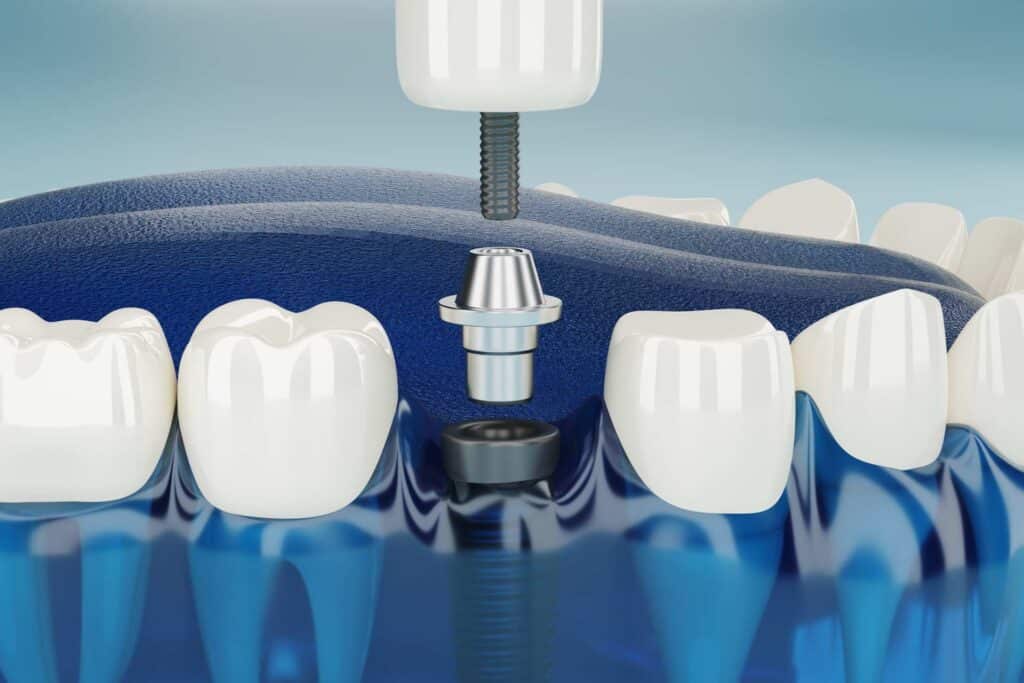
Dental implants, surgically inserted into the jawbone, act as artificial tooth roots for anchoring prosthetics, offering a lasting solution for tooth loss. Titanium, known for its biocompatibility, is commonly used, fostering bone growth around the implant in a process called osseointegration. Implantologists, specialists in the field of implantology, ensure proper placement and patient compatibility.
Key Types of Dental Implants
Implant Type |
Description |
|---|---|
| Endosteal | Endosteal implants are placed within the jawbone, resembling a tooth root. They are the most common option for replacing missing teeth. Endosteal implants provide a solid and stable foundation to support a dental crown or a fixed bridge. |
| Subperiosteal | Subperiosteal implants are positioned on the jawbone beneath the gum tissue. They are used in cases where the patient has insufficient jawbone to support endosteal implants. Subperiosteal implants are custom-made to fit the shape of the jawbone and provide a secure base for dental prosthetics. |
| Zygomatic | Zygomatic implants are rarely used and are inserted into the cheekbone (zygomatic bone) when there is inadequate jawbone available. They are employed when traditional endosteal or subperiosteal implants cannot be placed. Zygomatic implants are longer than conventional implants and are anchored into the cheekbone to provide stability and support for dental prosthetics. |
ABOUT OUR DOCTOR

Dr. Helen Carmenate
Dr. Carmenate is a highly skilled dentist with a focus on smile design, restorative dentistry, and cosmetic dentistry. She completed her Undergraduate Degree in Dentistry at Ibero-American University in the Dominican Republic and further advanced her training through a General Practice Residency at the Florida Institute for Advanced Dental Education (FLIADE) in Miami.
With a passion for creating beautiful smiles, Dr. Carmenate provides exceptional care and utilizes the latest techniques to enhance both dental health and aesthetics. Patients can trust in her expertise and warm demeanor for high-quality dental treatments.
COST

How much does a dental implant cost in Miami
The cost of a dental implant can vary significantly across the United States, with an average range between $3,000 and $6,000 per unit. However, in Miami and South Florida, dental implant costs tend to be more affordable. Many clinics offer comprehensive packages for between $2,000 and $3,500 per unit, which include the implant, abutment, crown, surgery, and consultation fees.
Dental Implant |
Description |
Cost in Miami |
Our Approximate Prices |
|---|---|---|---|
| Dental Implant + Crown | A dental implant that replaces the tooth root, topped with a crown | $1,900 – $3,500 | $1,500 – $3,000 |
| Implant-Retained Denture | Implant used to support a denture | $3,000 – $6,000 | $2,500 – $4,500 |
| Mini Dental Implants | Smaller implants used for added stability | $500 – $1,500 | $300 – $1,300 |
| All-On-4 Dental Implants | Full arch restoration with four implants | $15,000 – $25,000 | $10,800 – $20,800 |
| Full Dental Implant | Complete tooth replacement with an implant | $3,000 – $5,000 | $2,800 – $4,800 |
| Titanium Dental Implant | Implant made of titanium for enhanced durability | $1,500 – $4,000 | $1,200 – $3,200 |
Factors Affecting the Cost of Dental Implants:
Geographic Location: The cost of dental implants can differ based on the location of the dental clinic. Factors such as local market rates, competition, and the cost of living can impact pricing.
Number of Implants Required: The number of dental implants needed will influence the overall cost. Whether you need a single implant, multiple implants, or a full arch replacement, your treatment plan will be tailored to your specific needs.
Materials Used: The type of dental implant and restoration materials chosen can affect the cost. High-quality materials may have a higher price tag but offer enhanced durability and aesthetic appeal.
Additional Procedures: In some cases, additional procedures like bone grafting or tooth extractions may be necessary before the implant placement. These supplementary treatments can incur extra costs.
Insurance Coverage: The extent of insurance coverage plays a significant role in determining your out-of-pocket expenses. Review your policy to understand the specific benefits, limitations, deductibles, and copayments associated with dental implants.

Does My Dental Insurance Cover Dental Implants?
Dental insurance may cover dental implants, but coverage varies depending on the specific plan. Some plans offer partial or full coverage, while others may have limitations or exclusions. It’s important to review the details of your dental insurance plan to determine the exact coverage they provide for dental implants. I would recommend contacting your dental insurance provider for accurate information regarding your coverage.
Insurance Accepted at Miami Perfect Smile
At Miami Perfect Smile, we proudly accept CareCredit and Alphaeon Credit. These two popular healthcare credit options provide our patients with convenient and flexible payment solutions for their dental implant treatments. With CareCredit and Alphaeon Credit, you can easily manage the cost of your dental implants through customizable financing plans. Experience the benefits of these trusted credit options at Miami Perfect Smile and achieve your perfect smile with ease.
CONSULTATION

Consultation and evaluation of dental implants in Miami Perfect Smile
We specialize in cosmetic and restorative dentistry, including dental veneers, smile makeovers, dental implants, and more. We also provide emergency services.
An important thing to keep in mind is that at Miami Perfect Smile we accept all insurance plans for orthodontic procedures for which our patients are covered. Everything is for your well-being, your health, and for the beauty of your smile.
The design of the implants may vary slightly from one to another. But basically, the dental implant is made up of:
Dental crown:
It is the prosthesis that will replace the lost tooth. There are temporary crowns, which are placed immediately after the surgical intervention for the placement of the implant, and there are permanent crowns, made of different types of porcelain, among which the most resistant are usually zirconia.
Dental abutment:
It is the intermediate part of the implant, which in its lower area is inserted into the implant, and in its upper area it will support the dental prosthesis or crown. There are several types of dental abutments, which are classified according to the type of support they give to the prosthesis. Thus we have: abutment for screwing, abutment for cementation, or abutment with retainer anchor.
Implant:
It is the implant itself, that is, the piece that is anchored to the mandible or maxilla to serve as a new dental root. Its placement requires surgical intervention with local anesthesia.
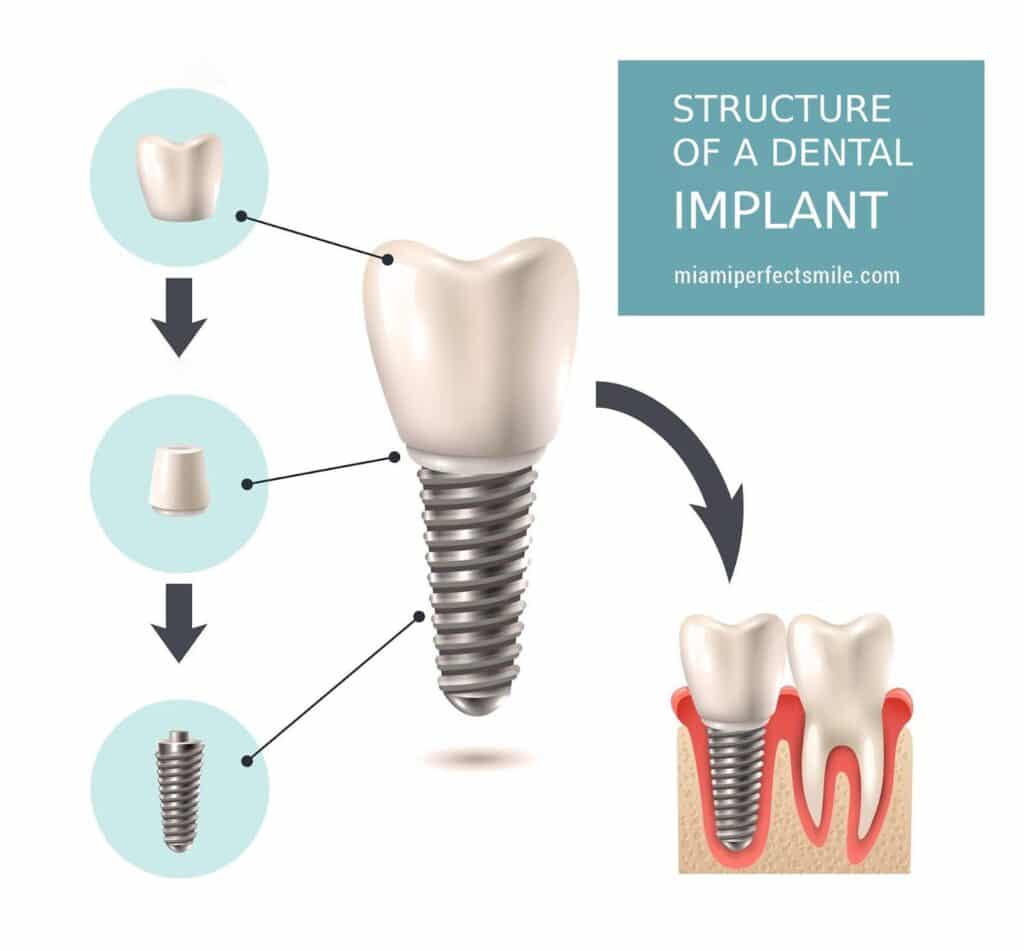
Strictly speaking, the dental implant is only the third piece on the above list. But it makes no sense to put in an implant if it is not to place the dental crown. That is why the crown is usually included in the concept of a dental implant and in the price of the treatment.
PROS AND CONS

Pros and cons of dental implants
Pros of Dental Implants:
Improved Appearance: Dental implants closely resemble natural teeth, providing a natural-looking and attractive smile. They are designed to fuse with the jawbone, offering a permanent solution for missing teeth.
Enhanced Oral Function: Dental implants restore the ability to bite and chew with confidence. Unlike other tooth replacement options, implants are stable and durable, allowing for comfortable eating and speaking.
Long-Term Solution: With proper care, dental implants can last a lifetime. They are designed to be a permanent tooth replacement option, eliminating the need for frequent replacements or adjustments.
Preservation of Jawbone Health: Dental implants help maintain the integrity of the jawbone. When a tooth is lost, the surrounding bone may deteriorate over time. Implants stimulate the jawbone, preventing bone loss and maintaining facial structure.
Improved Oral Health: Dental implants do not require alterations to adjacent teeth, unlike dental bridges. This preserves the natural teeth and promotes better oral health in the long run.
Cons of Dental Implants:
Surgical Procedure: Dental implant placement involves a surgical procedure, which may require local anesthesia or sedation. While the procedure is generally safe, there are inherent risks associated with any surgical intervention.
Healing Time: Dental implants require a healing period for the implant to fuse with the jawbone. This process, called osseointegration, can take several months before the final restoration can be placed.
Cost: Dental implants can be a significant investment compared to other tooth replacement options. The overall cost includes the implant surgery, abutment, crown, and any necessary additional procedures. However, the long-term benefits and durability of implants often outweigh the initial cost.
Not Suitable for Everyone: In some cases, individuals may not be suitable candidates for dental implants due to insufficient jawbone density or other oral health issues. However, bone grafting procedures can sometimes address these limitations.
Time Commitment: The process of getting dental implants requires multiple appointments and a longer treatment timeline compared to other tooth replacement options. This may not be ideal for individuals seeking a quick solution.
RECOVERY
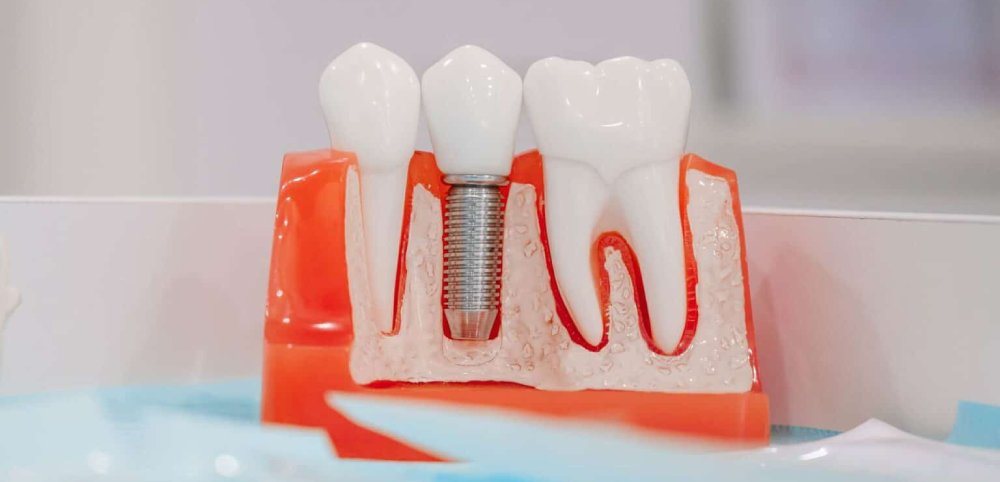
Tips for a Successful Recovery After Dental Implant Surgery
Recovery after a dental implant is a crucial phase in the overall treatment process. Following your dentist’s instructions is vital during this adaptation period. While individual experiences may vary, there are some general tips that can help promote a smooth and successful recovery. Here are key recommendations for a successful recuperation after a dental implant:
Rest and Limit Physical Exertion: In the immediate days following the surgery, it is important to avoid excessive physical efforts. While complete rest may not be necessary, it is advisable to minimize strenuous activities to allow the body to heal.
Follow Dentist’s Recommendations: Each case is unique, and your dentist will provide specific guidance tailored to your situation. It is essential to adhere to their instructions regarding rest periods and any additional care required.
Elevate Your Head While Sleeping: To reduce swelling and promote healing, elevate your head while sleeping. This can be done by using an extra pillow or propping up the headrest.
Soft Diet and Chewing on Opposite Side: In the initial stages of recovery, it is recommended to avoid hard foods and chew on the side opposite to the one with the implants. This helps protect the surgical site and allows for proper healing.
Stay Hydrated and Avoid Harmful Substances: Drink plenty of water and fluids to stay well-hydrated. It is crucial to avoid alcohol and smoking, especially for at least two months after the dental implant surgery. Smoking can hinder the healing process and increase the risk of complications.
Manage Bleeding and Inflammation: Use sterile gauze to control normal bleeding, and apply cold compresses to the outside of the mouth for 5-10 minutes to reduce inflammation. Additionally, take any prescribed medication as directed by your dentist.
Proper Oral Hygiene: For the first month after the surgery, avoid brushing or flossing the operated area. Instead, rinse your mouth with a prescribed mouthwash starting from 24 hours after the operation. Avoid using mouth rinses immediately after the surgery.
Remember, these tips are general recommendations, and it is essential to consult your dentist for personalized advice based on your specific needs. By following these guidelines, you can help ensure a successful recovery and long-term success with your dental implant.
CARE

Essential Care Tips for Post-Dental Implant
Proper care after dental implant surgery is vital for the long-term success and maintenance of your implants. In addition to your regular oral hygiene routine, there are specific care tips that can help ensure optimal healing and prevent complications. Here are important guidelines to follow during the postoperative period and beyond:
Postoperative Care: In the initial days following the surgery, it is recommended to consume soft or liquid foods at room temperature or even cold. Avoid hot foods for the first six weeks after the procedure. This helps promote healing and prevents unnecessary discomfort.
Maintain Excellent Oral Hygiene: Dental hygiene is crucial for the preservation of dental implants and preventing complications such as infections, inflammation, or implant failure. Brush your teeth at least twice a day using a soft-bristle toothbrush. Pay close attention to the implant area, ensuring gentle and thorough cleaning. Floss carefully, using implant-specific floss if recommended by your dentist. Regular dental check-ups and professional cleanings are also essential for ongoing implant care.
Avoid Smoking and Alcohol Consumption: Smoking and excessive alcohol consumption are detrimental to overall oral health, including the success of dental implants. These habits can lead to tooth degeneration and long-term complications. If you smoke, quitting is highly recommended. Additionally, minimizing alcohol intake promotes better healing and overall well-being.
Abandon Harmful Dental Habits: Certain habits can place unnecessary stress on dental implants and natural teeth. It is advisable to avoid activities such as nail biting (onychophagia), bruxism (teeth grinding or clenching), biting on hard objects like pencils or plastics, and using your teeth as tools for opening packages or performing tasks. Such habits can compromise the stability and longevity of your implants.
DENTAL IMPLANTS MIAMI
Frequently asked questions

On the subject of dental implants, patients or potential patients always have doubts. In this section we will answer the most frequently asked questions.
Who can get dental implants?
Basically anyone, as long as they really need them, is a good candidate for dental implants. However, there are some cases in which the use of dental implants is not recommended (either temporarily or permanently), in which implants of one material are preferred over another, or in which special procedures are required. These cases are:
- People allergic to metals: There are people allergic to metals, or to certain metals. Among them, allergy to titanium is very rare, because it is a hypoallergenic material, thanks to its nobility and its widespread presence in the earth’s crust. In cases of contact allergy to titanium (which is the most common material in implants and abutments), the use of zirconium implants or other ceramic material is recommended.
- Diabetic people: People with diabetes have a longer process of osseointegration or integration of the implant to the bone, or even have a risk that the implant will not integrate. The dentist may advise against the use of implants in these cases and suggest the use of bridges or removable dentures.
- Pregnant women: In the case of pregnant women, dentists advise against the procedure of placing implants during pregnancy. It is not that the implant itself brings problems to the pregnancy, but rather that, in the event that the woman needs to take antibiotics or anti-inflammatories due to complications from the implant surgery, she will not be able to take them because they are contraindicated during pregnancy.
- Patients with very poor oral hygiene: The placement of permanent dental implants in the mouth requires hygiene. If the person is not used to normal dental hygiene, the presence of implants in the mouth can cause complications.
- People with little bone: There are people who have little maxillary or mandibular bone, or have it of poor quality so that the implants will not be able to have a correct hold. In these cases, the dentist may recommend bone tissue grafting, but this makes the treatment considerably more expensive. There is a new type of treatment called a transzygomatic implant, which is highly indicated for patients with little bone, thanks to the fact that the implant is inserted in the area of the cheekbone (zygomatic bone).
- People with certain diseases or medications: Diseases or medications that can interfere with healing or osseointegration are usually a reason to discourage the use of dental implants. The recommendation not to use implants will be temporary or permanent depending on the disease or medication involved.
- People who smoke: The chemical components that result from the inhalation of burned tobacco smoke prevent the correct osseointegration of dental implants. Smoking affects healing and can cause local infections. If the patient is unable to quit tobacco permanently, the dentist will recommend that they at least temporarily quit. The person who is going to have dental implants cannot smoke for at least two weeks before the operation, and for at least 2 months after the operation. After this, it may be a good time to quit smoking permanently, since this habit will probably be related to the loss of the tooth that led to the need to place implants.
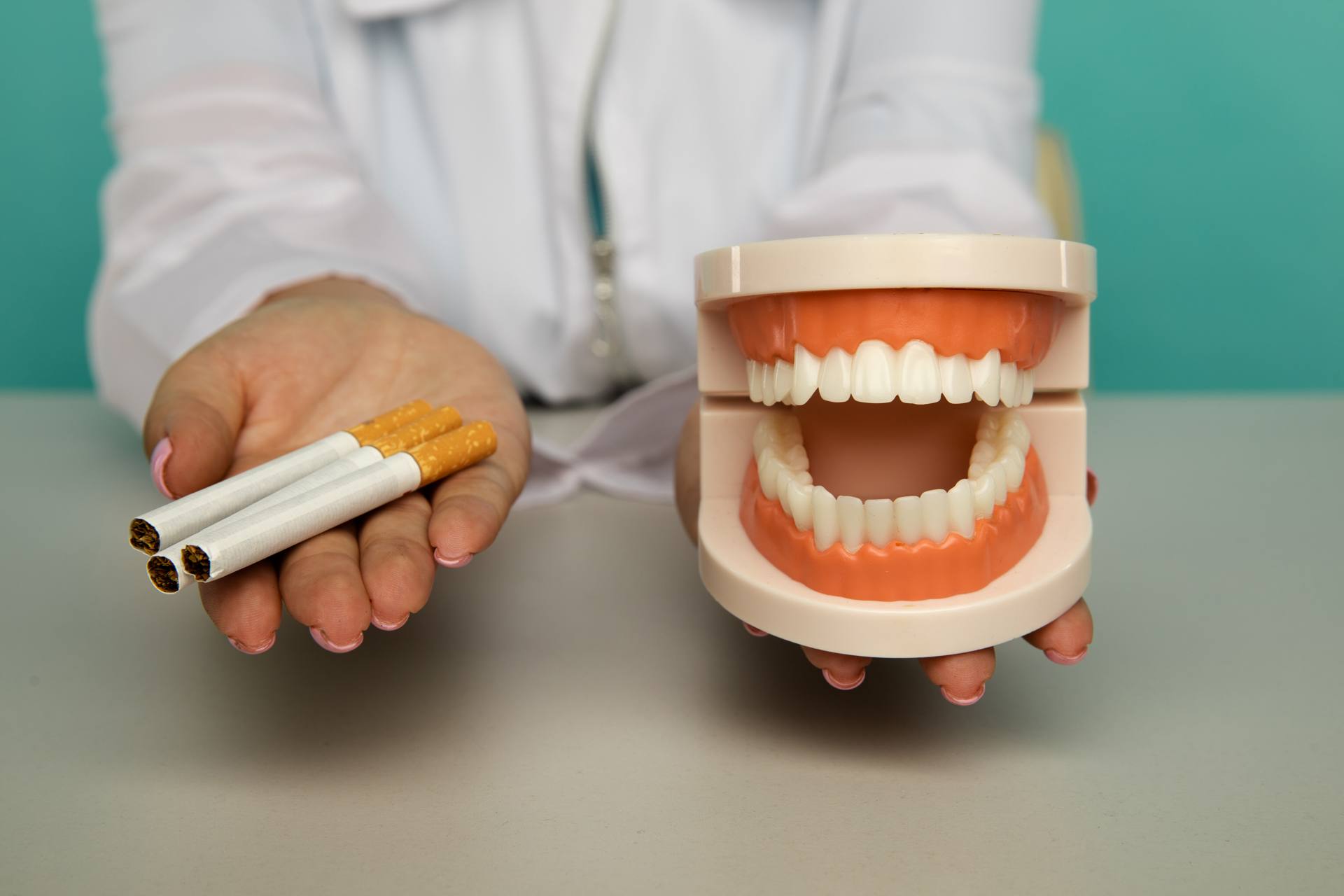
Does insurance in the US cover the cost of dental implants?
Patients often wonder if dental plans or insurance cover dental implant procedures. To a large extent, this question is due to the fact that people know that it is not common for insurance to cover aesthetic procedures. However, it is not as frequent that people resort to dental implants for purely aesthetic reasons (or at least not as frequent as in the case of cosmetic veneers or teeth whitening treatments).
So the answer is that if you are going to have dental implants for cosmetic reasons, it may not be covered by insurance, and if it is for functional reasons, it may be covered by insurance. But since this is only a possibility, it is better that you consult your case with your insurer and with your dentist.
Many US states have enacted laws that prevent dental plans from necessarily covering dental implant procedures and other cosmetic dentistry. The truth is that, except for a few States (Indiana and Maine), the vast majority of States have enacted such laws, which are called Non-Covered Services, and seek to protect dentists’ fees. Florida is one of the states where these laws are in effect. However, as we mentioned at the beginning of this article, at Miami Perfect Smile we accept all insurance plans for orthodontic procedures for which our patients are covered.
You will be able to learn valuable details on the subject of the Non-Covered Services laws in the US if you read an interesting publication of the National Association of Dental Plan, entitled What You need to know About “Non-Covered Services”. In the following map, taken from said publication on the official NADP website, you can see the US States that have approved said laws, those that have not approved them, those that are pending, and others.
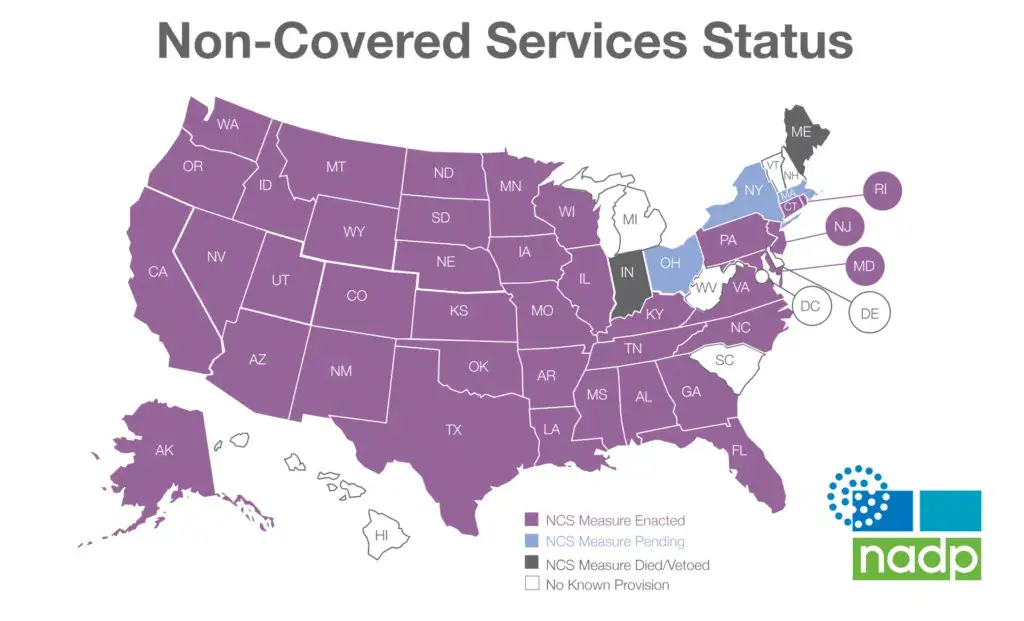
One of the data that the mentioned publication comments, on is that dental implants and teeth whitening will be Non-Covered Services (services not covered by insurance) depending on the laws of the State in question. State and not federal laws will stipulate whether or not the dental plan allows negotiating discounts with the dentist on services of this type, whether the policy covers some treatments and not others, or to what extent a plan partially or totally covers a treatment expensive (in the case of dental implants, for example, it can be 50% of the price), or if the patient has already exceeded the allowed annual amount, etc.
Do dental implants hurt?
The procedure itself does not hurt, since it is performed under local anesthesia. After placement, dental implants may cause normal minor pain or discomfort, but not for more than a short time, ranging from 1 week to 10 days.
It is completely normal that, after a surgical procedure such as the placement of implants (which will always be invasive to some extent), the patient may feel some postoperative discomfort or pain. This is an acute or short-term sensation. After some time, which will depend on each patient but which usually lasts a few weeks, the body finally assimilates the dental implants, covers them with bone thanks to the aforementioned osseointegration process, and any pain disappears.
However, if the pain recurs frequently, in the long term, and chronically, then the dentist should be notified. Chronic or recurring pain is not normal. This can occur when the implant has been inserted too close to the dental nerve, and the body causes infection and inflammation of the tissue around the implant (peri-implantitis), which can affect the alveolar nerve. If peri-implantitis occurs at the maxillary level, it can lead to chronic rhinitis or sinusitis due to the proximity of the facial sinuses. The solution for these problems is the administration of adequate antibiotics, but a previous diagnosis must be made by means of X-rays.

Other reasons for unusual pain related to dental implants may be: that the implant screw has become loose, that you are allergic to titanium without knowing it, that the dental implant is loose because the body has not generated the osseointegration tissue, and in a tiny percentage of cases, it may be that the body is not assimilating the implant. But, as we say, these are not normal pains. The normal thing is that dental implants do not give more than slight discomfort and minor pain for 7 or 10 days, after which, as comfortable as they are, you will not even remember that you are wearing them.
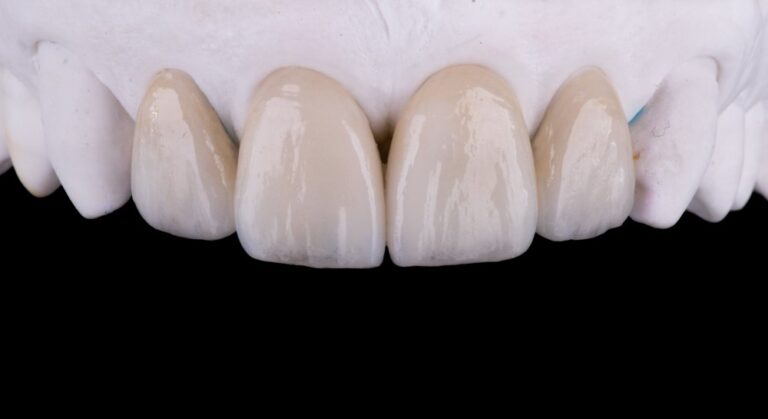
How much is a dental impland and veneers
The cost of dental implants and veneers can vary significantly depending on various factors, such as the location of the dental clinic, the dentist’s expertise,
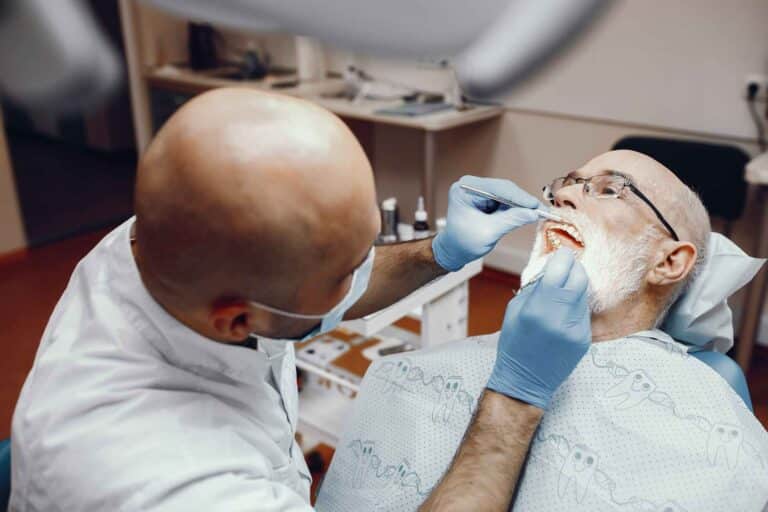
All possible problems with dental implants and their solutions
Having problems with dental implants is the biggest fear that patients face when deciding on this treatment. And it is normal that this is the
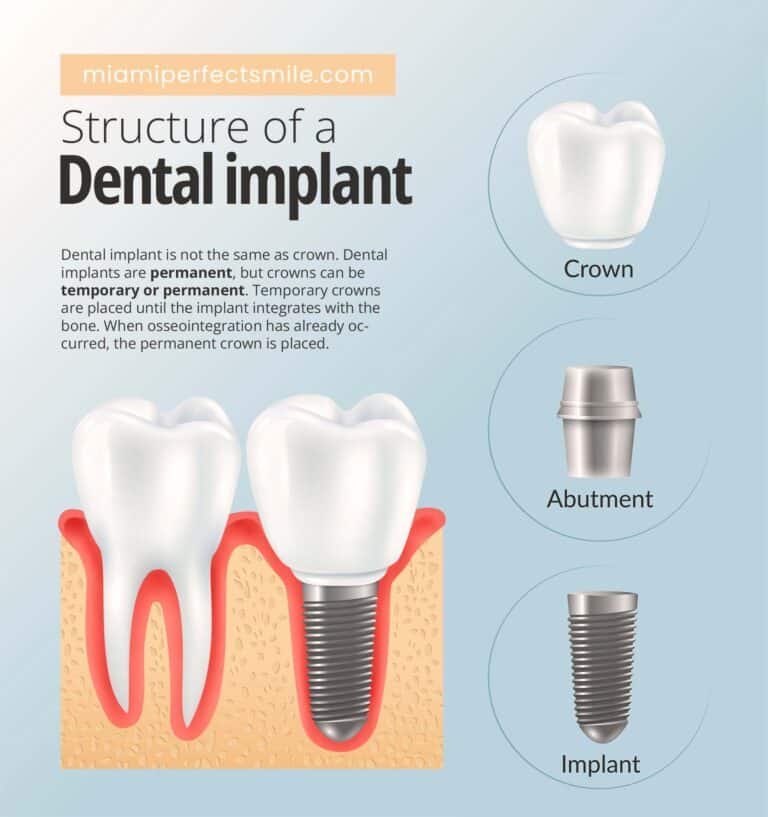
Difference between temporary and permanent dental implants
In our post today we will take a detailed look at the difference between temporary and permanent dental implants. To clarify this issue, we must

How long do permanent dental implants last? Here is the definitive answer
It is normal that today many people wonder how long permanent dental implants last. Dental implants, thanks to their overwhelming success as a dental treatment,
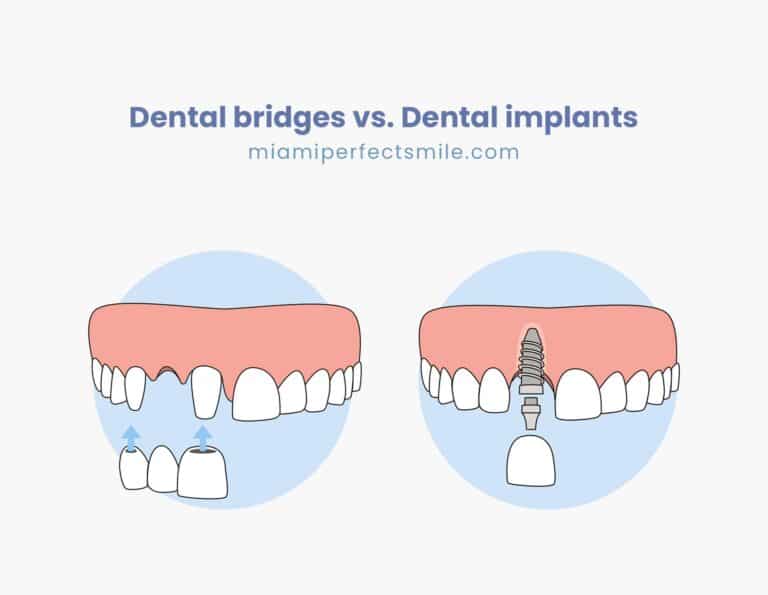
Dental bridges vs Dental implants (with 2 comparative tables)
Making a comparison of dental bridges vs. dental implants is important today. Dental bridges have been in use for quite some time now. But although

Foods not to eat with dental implants (stage by stage)
What are the foods that should not be eaten with dental implants? This is one of the questions that anyone who chooses to have one
